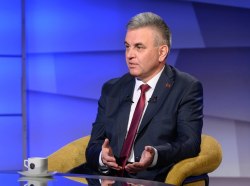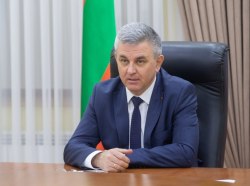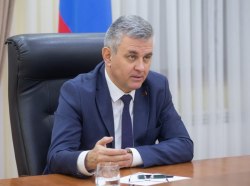Tiraspol, 18 July. /Novosti Pridnestrovya/. A Moldo-Ukrainian post at the Pridnestrovian border was opened in contravention of all provisions on the negotiating process. Joint control has a specific political goal — to put pressure on Pridnestrovie. The international mediators, who are to facilitate the negotiations, with the exception of Russia are silent. The «5+2» negotiating platform has been blocked. We can see a clear-cut strategy to fuel the conflict.
This is what the Pridnestrovian foreign minister, Vitaly Ignatyev, spoke about with journalists, commenting on yesterday's ceremony of opening a Moldovan post at Ukraine's border and customs checkpoint Kuchurgan.
On 17 July 2017 Ukrainian President Petr Poroshenko and Moldovan Premier Pavel Filip gave a start to the joint work of Moldovan and Ukrainian border guards at the Pridnestrovian border.
«We, Ukraine, are ready to contribute as much as possible to the restoration of the territorial integrity, sovereignty of the Republic of Moldova and do everything to restore what was provoked 25 years ago and has had such a heavy impact on the hundreds of thousands of people who live in Pridnestrovie today," said Poroshenko.
He actually confirmed the statements made by the Ukrainian ambassador Ivan Gnatishin almost two months ago in Kishinev. «Kiev is seeking to impose a blockade to ensure that the trade relations of the breakaway region are governed by Kishinev," the Ukrainian diplomat said back then.
Thus, the establishment of the joint post in Kuchurgan is a political measure aimed to put pressure on Pridnestrovie, Ignatyev underscores.
It should be noted that earlier Kishinev claimed that Moldovan servicemen at the Pridnestrovie-Ukraine border would only fight against smuggling. In the meantime, the EUBAM mission has been monitoring the border since 2005 and reports on transparent traffic.
«It is possible that this monitoring will be minimal at an early stage, and so the problems of our citizens will be minimal as well. But this does not mean that tomorrow this control will not work in full, and then we'll have the full range of negative costs," Ignatyev warns.
MFA analysts had earlier estimated the negative impact of joint posts. According to the diplomat, a problem mechanism has been created that will adversely affect export-import operations, the movement of people and goods, as well as create a new factor of military tension — there is no security zone with peacemakers at the Ukrainian border, but there are Moldovan servicemen instead, who can receive any commands.
As was earlier reported, Pridnestrovie may face the prospect of multi-million losses. This is the main trade corridor of the country, and its control by Moldova is similar to putting a noose on Pridnestrovie's economy.
«13 more checkpoints will be installed in the future, and Pridnestrovie will find itself in a boundary circle which will be impossible to leave or enter without Kishinev's or Kiev's approval," says an article in Russia's Nezavisimaya Gazeta.
«It is certainly unacceptable for us; these are inadmissible unilateral actions that may lead to serious negative costs and consequences, with which some of our international partners agree," says Ignatyev, noting that Pridnestrovie's stance is similar to that of Russia's.
On 7 July 2017 Russian MPs appealed to the authorities of Moldova and Ukraine to renounce all forms of pressure on Pridnestrovie and the action to organise its blockade.
The joint posts, which actually mean a new phase of Pridnestrovie's blockade, emerge amid the stagnation of the negotiating process in the «5+2» format. According to Ignatyev. the situation is unique: the negotiating process has been blocked not by the parties to the conflict but by international partners who are to promote it.
The Austrian chairmanship has so far refused to hold a «5+2» meeting, referring to the lack of progress in the negotiations between Kishinev and Tiraspol. In the meantime, by exerting pressure on Tiraspol, Moldova violates one of the most important principles of the negotiating process. Besides, Kishinev refuses once again the commitments made at an official meeting held in Berlin last summer.
«We've heard very many statements over 27 years of conflict. There have been hundreds of them made at different levels. As a result, they have been totally untrue and have not been observed by the Moldavian side. It is natural there is no confidence in Moldova under such circumstances. There was no confidence yesterday; there is no confidence today. If such acts inciting conflict continue, this confidence is unlikely to appear tomorrow," notes Ignatyev.
Even Russia's MFA spokesperson, Maria Zakharova, had to make a statement: «If the conflicting parties could agree on their own, there would be no need for international meditation.» Russia also insists on the immediate call of an international «5+2» meeting, expressing concern over the situation around Pridnestrovie.
Meanwhile, the EU, which is an observer in the negotiations, finances the establishment of Moldo-Ukrainian posts, effectively taking part in putting pressure on Pridnestrovie.
«I'd like to point out that, for example, the European Union, which is an observer in the negotiating process, is directly taking part in the implementation of joint control. And, therefore, statements that border control is ostensibly a two-sided matter of Moldova and Ukraine do not stand up to any criticism," says Ignatyev.
He stresses that the Moldo-Pridnestrovian conflict is international, and serious international actors are involved in its settlement — Russia, the EU, OSCE and the US, Therefore, all actions that may lead to negative consequences for one of the parties should be resolved only at the negotiating table rather than through pressure.
«Experience has shown that no unilateral measure taken throughout the entire period of conflict settlement has benefited but rather led to confrontation and escalation of tensions," notes the diplomat.
Ignatyev also explains that all external participants who back such steps must understand their full responsibility as we can see here a clear-cut strategy to fuel the conflict.








